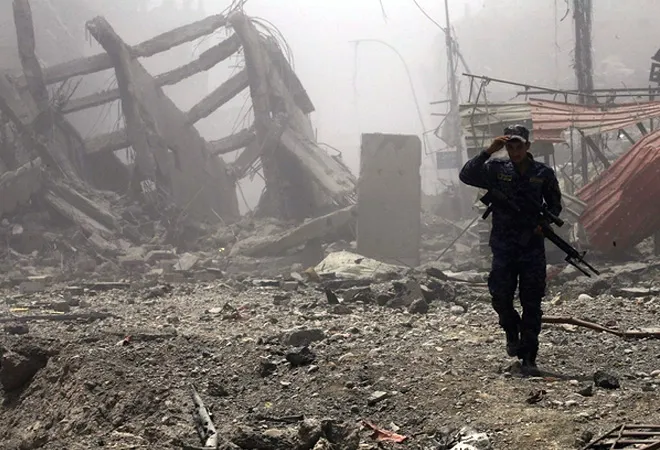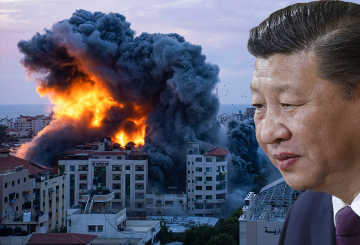India's Minister of External Affairs, Sushma Swaraj, held another meeting in the capital with family members of the 39 Indian construction workers considered missing in Iraq since 2014. While multiple accounts since have suggested that the workers, thought to be kidnapped by ISIS, were killed, the lack of physical or scientific evidence has kept the Indian government in hope that they still may be alive somewhere.
After Iraq's Prime Minister Haider al-Abadi visited Mosul two weeks ago, declaring the besieged town where Abu Bakr al-Baghdadi announced the formation of the "caliphate" free from ISIS, India sent its envoy, Minister of State for External Affairs V.K. Singh, to Erbil in Iraqi Kurdistan to continue its quest to find out about the fate of its missing citizens. Three years since their disappearance, perhaps a poor understanding of the ground dynamics of the Iraqi civil conflict against the so-called Islamic State has created a quagmire of sorts for New Delhi. While the government has been repeatedly meeting the families of those missing, the constant offerings of hope to the bereaved has perhaps been the most unfortunate outcome of this exercise, with little to no basis or workable intelligence to claim that the 39 are, in fact, alive.
The constant offerings of hope to the bereaved has perhaps been the most unfortunate outcome of this exercise.
Over the past week, India added more confusion to this story, by claiming information suggesting the missing people could be in a prison in Badush, a village in the Nineveh province, northwest of Mosul. However, the subsequent visit by Iraq's foreign minister Ibrahim al-Jaafari to India has added further to the chaos, as he clarified that no information is available on the fate of the missing Indians, and that the Badush prison is under Iraqi Army control. A visit to Badush by Indian journalist Anchal Vohra found the reality against New Delhi's narrative as well, as she reported on the Badush prison lying in ruins, with roofless buildings and an area littered with mines. It was the first week of March when Iraqi Army had claimed full control over Badush and its prison, part of the forces' campaign to re-take western Mosul from ISIS, on their way to claim the second largest Iraqi city out of ISIS's control completely.
However, keeping these information misnomers aside, it is consequentially more important to try understand what could have happened to those 39 Indian construction workers, and for this, it is pivotal to understand how ISIS works as an insurgent group. First of all, the fact that, as per reports, the Indian workers were taken hostage by ISIS in 2014 is important in itself. The period from 2014-15 was when ISIS made huge grounds both in Iraq and Syria, it took over the task of governing large swathes of territory, which, as per some analysts, at its peak was geographically as big, if not bigger, than the United Kingdom. During this period, thousands of foreign fighters joined the supposed caliphate, and by the end of 2015, ISIS was worth an estimated $2 billion from a variety of sources, such as oil smuggling, crime and taxation and perhaps, most importantly, kidnappings and extortions.
During the period of the workers' disappearance, ISIS derived a lot of money from abducted foreign nationals, but also used them to be involved in construction and reinforcement projects. However, non-Muslims were in a more precarious position than local Muslim citizens of a region under ISIS's reign. While local non-Muslims were required to pay jizya (protection tax), the cases of executions of non-Muslims during ISIS's juggernaut to claim territory in Iraq and Syria were expected to be stratospheric, with no official counts available. These ground realities dictated by ISIS ideology put the missing Indian workers in an almost paralytic position, even if we would like to entertain a mirage of a scenario where they may have escaped.
The above, of course, is penciling in and trying to build an argument linking with realities of ISIS and its dealings with prisoners. However, the fact that the number of Indian workers in Iraq was 40, and not 39, is where much of the available credible evidence lies. Harjit Masih, who was part of the group abducted in Iraq, was the only one to escape. As per his accounts, the other 39 were shot dead in front of him, and he was the sole survivor of the execution-style event orchestrated by ISIS. However, Masih's account is seemingly being considered as invalid due to the lack of physical evidence, which, in all probability, the Indian government may never find. Badush prison was the scene of a mass execution by ISIS in 2014, where even conservative estimates put the death toll above 1,000. The Badush region, as much of Mosul and its neighbouring geography, is littered with unmarked graves and mass graves. Attempting to find mortal remains or DNA evidence there is next to impossible.
Harjit Masih, who was part of the group abducted in Iraq, was the only one to escape.
The argument that the workers could still be alive under ISIS arrest has, as of today, become even more unviable, as the great territorial gains that ISIS made during the last two years have diminished significantly. Keeping prisoners during territorial battles with dwindling number of combatants is not a viable strategy, add to this the fact that, as per information available, no ransom demands were made for the Indian workers to the Indian embassy in Baghdad, the consulate in Erbil or to the Iraqi Army. Looking for a silver lining around a cloud burst is a futile exercise both for the state and, more importantly, for the families of the missing 39.
This commentary originally appeared in Huffpost India.
The views expressed above belong to the author(s). ORF research and analyses now available on Telegram! Click here to access our curated content — blogs, longforms and interviews.




 PREV
PREV



